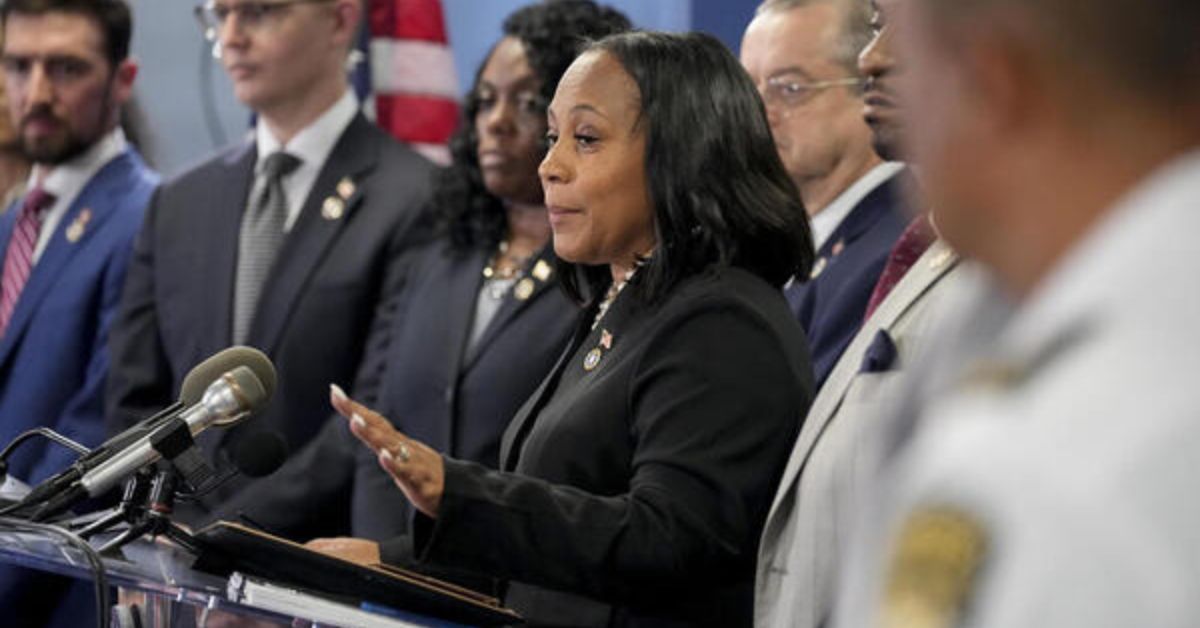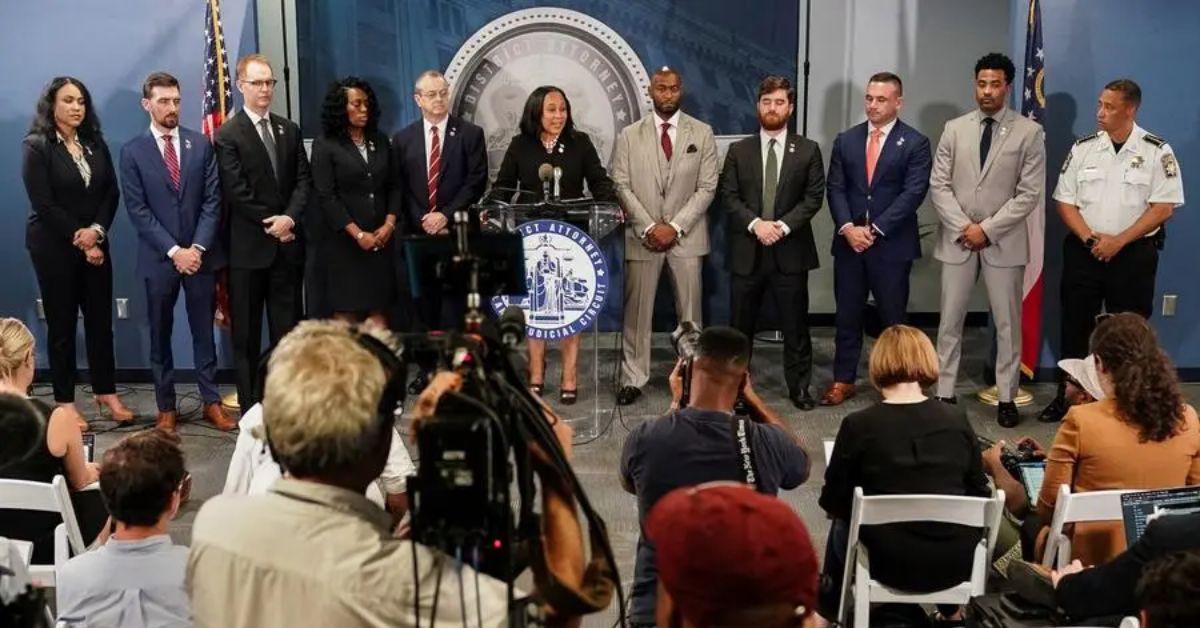Former President Donald J. Trump and 18 of his associates are charged with criminal conspiracy in Georgia over his 2020 election loss. The case has little in common with another high-profile racketeering case currently underway in the same Atlanta courthouse, involving superstar rapper Young Thug and his associates.
State of Georgia v. Donald John Trump et al. has only been going on for a little over a month, but the 15-month-old gang case against Young Thug provides hints as to how it may play out: a slow pace, an avalanche of pretrial defense motions, extraordinary security measures, pressure on lower-level defendants to plead guilty, and a fragmentation into separate trials.
Rapper Young Thug (born Jeffery Williams) and 26 others were charged with racketeering in May 2022 in Georgia under the RICO (Racketeer Influenced and Corrupt Organizations) Act. The RICO indictment against Mr. Trump was similar in that it alleged the existence of a criminal “enterprise” whose members worked together to achieve unlawful ends.
According to the prosecution, Mr. Williams is a leader in the criminal street gang known as Young Slime Life (YSL), whose members have committed murder, drug trafficking, and property crimes in order to illegally obtain “money and property.” (The counterclaim states that YSL is merely a record label.)
The tweet below verifies the news:
What do Donald Trump and Young Thug have in common?
They’re facing racketeering cases in the same Atlanta courthouse, under the same prosecutor.
The 15-month-old gang case against the superstar rapper offers glimpses of how Trump’s case may unfold. https://t.co/V2JNLsgSl1
— The New York Times (@nytimes) August 20, 2023
From an original list of 28, however, only eight defendants remain in Mr. Williams’ case. Some cases have been dismissed because the defendants were unable to locate counsel or were evading capture. Others have taken plea deals, as is typical in major racketeering cases, and in doing so have made confessions that could aid the prosecution in their pursuit of conviction against the remaining defendants.
The public and the press have been banned from entering the courthouse following a number of unusual episodes, including claimed attempts to smuggle drugs into the courtroom.
And astonishingly, the case has been delayed in the jury selection phase since January, with many prospective jurors claiming they would incur hardships if forced to participate in a trial that originally was projected to last six to 12 months.

A young woman was questioned about her life, her goals for the future, and if serving as a jury would be a hardship on Thursday morning, when she was one of more than 2,000 potential jurors who entered the courthouse.
It wouldn’t, she assured me. When asked if she was familiar with Young Thug, she said that she was and that she like his music, which would make hearing the case feel “surreal,” though she added that she was open to hearing all sides of the argument.
As part of a deadly gang war that lasted for at least eight years in a city widely regarded as a bastion of music industry innovation, the YSL indictment is substantially more detailed than the Trump case, outlining nearly 200 criminal activities.
Here is a small selection of the news from the past several weeks; each of these items is worthy of further research:
- Florida Arrest: AEW Tag Team Title Holder Cash Wheeler Charged with Aggravated Assault
- Proud Boys Leaders Could Receive 30-year Terms for Sedition, Says Justice Department
The killing of Donovan Thomas, a go-between who played a significant role in the rise to fame of a number of rap artists, in 2015 is believed by investigators to have inflamed an existing crosstown rivalry between YSL and a gang called YFN.
Authorities claim that many Atlanta residents took sides in the wake of the murder, leading to a wave of retaliatory shootings around the city. It’s a different universe than the one where the President holds meetings and uses voting tools. However, professionals warn that the Trump case, with its own well-known defendant and extensive scope, could face similar challenges.
Prosecutors also detailed a “criminal organization” in Mr. Trump’s indictment, which included high-profile figures like former White House chief of staff Mark Meadows and Mr. Trump’s former personal lawyer Rudolph W. Giuliani, as well as lesser-known Trump supporters like Atlanta bail bondsman Scott Hall, who was charged with aiding and abetting a data breach at a rural Georgia elections office.
The indictment alleges that the Trump campaign conspired “to unlawfully change the outcome” of Mr. Trump’s 2020 presidential election in Georgia. Ms. Willis, an experienced prosecutor, has stated that she values the fact that RICO indictments facilitate the presentation of big, broad, and understandable stories.
The YSL and Trump indictments, each spanning dozens of pages, detail the alleged conspirators’ “acts in furtherance of the conspiracy” and portray a picture of an intricate “organization” in which the defendants are all interconnected. Murder and aggravated assault in the YSL case, and “false statements and writings” and “conspiracy to defraud the state” in the Trump case, are examples of clearly unlawful behavior.
They also include “overt acts” that are not illegal but serve to achieve the conspiracy’s objective. Mr. Williams’s performance of rap songs with violent lyrics is included as “overt acts” in the YSL indictment, a legal technique that has sparked a passionate discussion about free speech and whether hip-hop, a quintessentially Black art form, is being scapegoated for racial reasons.
Here is a small sampling of news from the last few weeks, all of which are worth more research:
- Southwest Braces for Rain and Flooding from Hurricane Hilary
- Proud Boys Leaders Could Receive 30-year Terms for Sedition, Says Justice Department
Mr. Williams’ legal team submitted a motion last year asking the judge to throw out the lyrics, but the judge has yet to make a decision on the matter. Former Georgia prosecutor and trial attorney Chris Timmons predicted a similar free speech battle would break up over Mr. Trump’s tweets.
The 98-page indictment is littered with references to tweets he sent in the months following the 2020 election, detailing Washington’s efforts to set up fake pro-Trump electors in Georgia and other states, persuade legislators in those states to accept them, and pressure Mike Pence, then the vice president, to throw a wrench in the final Electoral College vote.
The indictment includes tweets that, taken out of context, could seem pretty innocuous. OANN has begun airing the Georgia hearings. Amazing!” A month after Election Day, on December 3, 2020, Mr. Trump made reference in a tweet to the airing of a state legislative hearing at which his supporters made several false charges about election fraud by a far-right TV network.

Mr. Trump has also spread clear falsehoods about election fraud in the past via his tweets. December 2020: “People in Georgia got caught cold bringing in massive numbers of ballots and putting them in ‘voting’ machines,” he wrote.
Mr. Timmons predicted that Mr. Trump’s legal team would try to have his Twitter tweets and a recording of a call the former president made to Georgia’s secretary of state, Brad Raffensperger, thrown out on free speech grounds.
“They’re going to try to suppress the recording of the phone call, and probably try to suppress any tweets that were sent, and any text messages, anything along those lines, as violative of the First Amendment of the United States Constitution,” he said.
Pretrial motions from a swarm of defense attorneys are virtually guaranteed in the Trump case, just as they were in the YSL case. Mr. Meadows, one of the defendants, has already asked for the case to be transferred to federal court.
Mr. Trump and former Justice Department employee Jeffrey Clark, who are both defendants, may seek to have the trial moved out of liberal Fulton County and into more Trump-friendly areas by filing for removal.
Attorney Harvey Silverglate, who is defending defendant John Eastman in the Trump case, said last week that he expected several defendants to move to sever their cases since they were involved in the planning of the fraudulent elector scam.
The following is a sampling of recent news stories that all warrant additional investigation:
- Arrest Made of Man Who Reportedly Gave Out Indecent Stuff to Adolescent Girls at a California Fair
- People Are Calling Me Racist Because I Reported a Man Living Under My House to the Police
Because each defendant faces allegations of racketeering and anywhere from one to forty different crimes, he characterized the case as “unmanageable” and warned against its potential outcome. When asked to elaborate on his client’s innocence, Mr. Silverglate remarked, “This is a case that wouldn’t reach trial in two years.”
The office of Ms. Willis has proposed starting the Trump trial in March, although the likelihood of this happening is quite low. Just Mr. Meadows’s attempt to have him removed might lead to a federal appeal, the resolution of which could take months.
Prosecutors can be harmed by stretching out a case because witnesses lose interest or pass away, but for some defendants, like in the YSL case, just the thought of a lengthy court battle is enough to induce them to take a plea agreement. Mr. Timmons, who handled many RICO cases, said that prosecutors usually want to get guilty pleas from lesser defendants so that they can then go after the most important or powerful defendant.
“Your goal is to roll that up like a carpet, working at the bottom and working your way to the top,” he said. While a guilty plea for a rapper (unless they are considered snitches) might not end their careers, for a lawyer (and there are many lawyers on the Trump indictment) it would mean losing their license to practice law.
A court battle with Ms. Willis, a powerful prosecutor with years of experience litigating RICO cases, might be epic if those attorneys decide to stick around. Mr. Trump is seeking reelection despite being charged with crimes in three different states and one federal district (Florida, New York, and Georgia).
He can take heart from the fact that Mr. Williams released his most recent album while in jail and it debuted at the top of a Billboard chart this summer if he is worried about how his legal difficulties would damage his popularity.
If you’re looking for crime news from across the state or the country, go no farther than The California Examiner.




